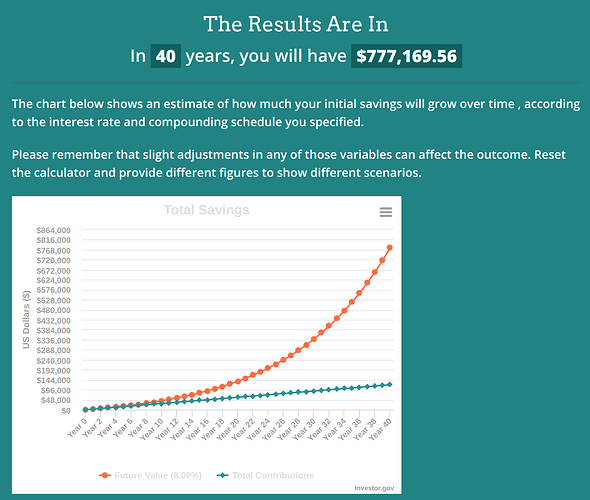Just to be clear, I did not intend to say that you don’t have the skill for a mgmt position, this was just a general remark ![]()
Sorry misread that paragraph about your role.
Ok you are so truly convinced that you can’t improve your salary without compromising your work style / preference.
Let’s hope everyone else has done a similar deep introspective before they sort their priorities in terms of direct/ non- indexing vs incremental saving the way you do.
Come on! As it was said here, some people watch football in their free time, some people optimize their stocks portfolio to save 0.01% of TER. It’s a hobby!
I always try to split my position between multiple providers whenever possible. (For example for S&P 500 I buy both VOO and IVV instead of picking one).
With the advent of low cost passive ETFs, we no longer need to pay 1%+ on holdings.
But some ETFs still charge, say, 0.3%. While quite low, on a $1MM portfolio that still adds up to $120k over 40 years and that’s before loss due to compounding.
For the buy and hold investor, would it make sense to just buy the underlying (or say top 100 holdings of the underlying) and save the ETF costs?
EDIT: I put the numbers into a calculator and it gave the loss over 40 years as:
(assumptions $1000k portfolio. 8% return. 0.3% expense)
I guess there are some arguments against:
-
Hassle of dealing with a lot of companies. One way around this is to take just the Top 100 in the index (if more than 100). This usually accounts for a huge portion of the value.
-
Difficulty and cost of re-balancing. You can deal with this easily by simply not re-balancing at all and saving on those expenses too. Or using the IBKR re-balancing feature to easily do the re-balacing. You could do this, say, once per year. Combined with #1, this would also be much cheaper than the ETF.
-
Hassle of re-investing. I’m anyway re-investing each month my dividends and interest, so this is no incremental hassle. In retirement, you can just let this flow to cash and use it to pay your expenses.
-
Hassle filling in your tax return. The initial loading of 100 positions is for sure a pain, but if all values and dividends are automatically pulled in future, then the maintenance isn’t too bad or at least not paying $20k per year bad.
This may be interesting to you: Is direct indexing more Mustachian than ETFs?
- Withholding tax on dividends.
Have you ever tried reclaiming tax withheld from countries like Germany or France?
No. Have you? If so, what was the process and what did you find difficult about it?
I saw a news alert that it is now all digital: Germany and Switzerland welcome the digital filing of tax reclaims from 1 December 2023 | Deloitte Luxembourg | Tax | News
It was for the specific ETFs I was looking at. I agree the super cheap ones that are 0.03% you lose only $77k on $1MM.
why do you think that?
See: Newbie question on German individual stock dividends, IBKR - #13 by wolle
Besides the paperwork this also involves a 30 EUR fee to IBKR (per stock or dividend payment, not sure). I never went any further than this, as I do not have that big DE positions.
I, however, went through the process several times in Denmark, the required documentation is less, you just need a stamp from the Swiss Steueramt that you are a tax resident of Switzerland and statements from the broker.
But the process takes forever, still waiting to get my submission from July 2022 processed…
I guess that makes sense. There are always new companies created and old ones disappear.
So you could do the re-balancing, say, annually via the IBKR re-balance feature.
Worse case you have 100 sales and 100 purchases. With a bit of hysteresis, you could likely keep re-balancing transactions to a minimum.
Yes, I started out with that concept and stopped (after 11 positions). To much brain space, decision making and too far from a real index as long as you’re not rich yet.
I anyway have over 50 individual stock positions and average over 50 trades per month, so moving to 100 positions with annual re-balancing would be a significant simplification for me ![]()
I have never done it - after having looked at it.
That said, I admit I wasn’t aware of new rules from 2023 - will take a look into it.
It still sounds like a bit of a pain for small positions though - and is for multiple countries.
